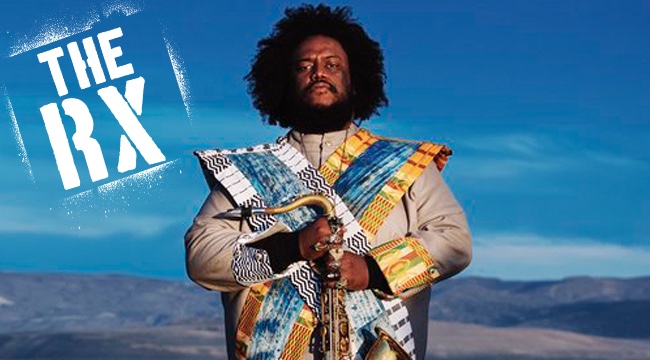
The RX is Uproxx Music’s stamp of approval for the best albums, songs, and music stories throughout the year. Inclusion in this category is the highest distinction we can bestow, and signals the most important music being released throughout the year. The RX is the music you need, right now.
Los Angeles-based tenor saxophonist, composer, and producer Kamasi Washington has been all the talk of jazz circles since his massive 2015 debut, The Epic, and his work on Kendrick Lamar’s To Pimp A Butterfly. It’s been said, by intellectual authorities such as the Los Angeles Times and NPR that Washington has revitalized the perception of jazz, that he’s made the once-flagging scene exciting again — no La La Land. However, with his latest release, Heaven And Earth he seems disinterested in delivering a product for mainstream understanding or acceptance of a casual fan, instead going right back to his epic well of inspiration for massive, sweeping arrangements that could score spacefaring adventure movies or bring down the house at a packed cathedral.
This is heady, existential stuff, but by no means is it inaccessible. It’s just that accessibility isn’t the first thing on Kamasi’s mind as he leads his band, the Next Step, and the assembled orchestra and vocal choirs to the heights of histrionics in search of nothing less than the meaning of life. He explains that “the Heaven side of this album represents the world as I see it inwardly, the world that is a part of me. Who I am and the choices I make lie somewhere in between,” while “the Earth side of this album represents the world as I see it outwardly, the world that I am a part of.” That interplay between the internal and the external, between thoughts and actions, between faith and works, forms the hinge on which the entire, elaborate contingent spins.
Jazz heads may know that Washington isn’t exactly reinventing the wheel here. Choral arrangements and orchestras aren’t primarily known as mainstays of the jazz tradition, but they’ve made their appearances in the genre’s 100-year history. Kamasi knows this and wisely leans into those sparsely-traversed waters, using the sounds to both nod to tradition and elevate, transforming it, burnishing it, reshaping it, and re-contextualizing it. Nothing here would sound out of place underlining a particularly awe-inspiring camera sweep in the latest action hero film, as “The Space Traveler’s Lullaby” certainly could do.
In fact, Kamasi seems to take inspiration directly from such unusual influences for a genre that has long felt like the domain of stodgy academics and snooty intellectuals. Take “Fists Of Fury,” which borrows both its title and its foundation from the 1972 Bruce Lee vehicle Fist Of Fury. Repurposing the film’s theme, Washington evokes the battle central to the conflict of the film’s narrative and projects it outward, transforming it into a rallying cry for a people seeking justice. “We will no longer ask for justice,” goes the refrain. “Instead, we will take our retribution.” Elsewhere, Washington finds inspiration in video games for the militant, swaggering “Street Fighter Mas.” It sounds like exactly that, a back alley brawl for stakes beyond simply winning or losing.
“Show Us The Way,” the album’s penultimate moment from the Heaven disc is exultant and exuberant, reaching for spiritual nirvana with its repeated chorus of “Dear Lord, show us the way,” breaching the gap between worship and contemplation with its plaintive sax work and choral exhortations.
Heaven And Earth is at times overwhelming and labyrinthine, which can feel daunting in one listening session. While Kamasi’s previous EP, Harmony Of Difference felt self-contained, with its catchier moments lending it universality, Heaven And Earth may intimidate folks who prefer their jazz groovier, simpler, or more soulful. But for anyone looking for a hearty listening experience, there is perhaps no other working musician’s output more nourishing — for both the body and the soul.
Heaven And Earth is out now via Young Turks. Get it here.






